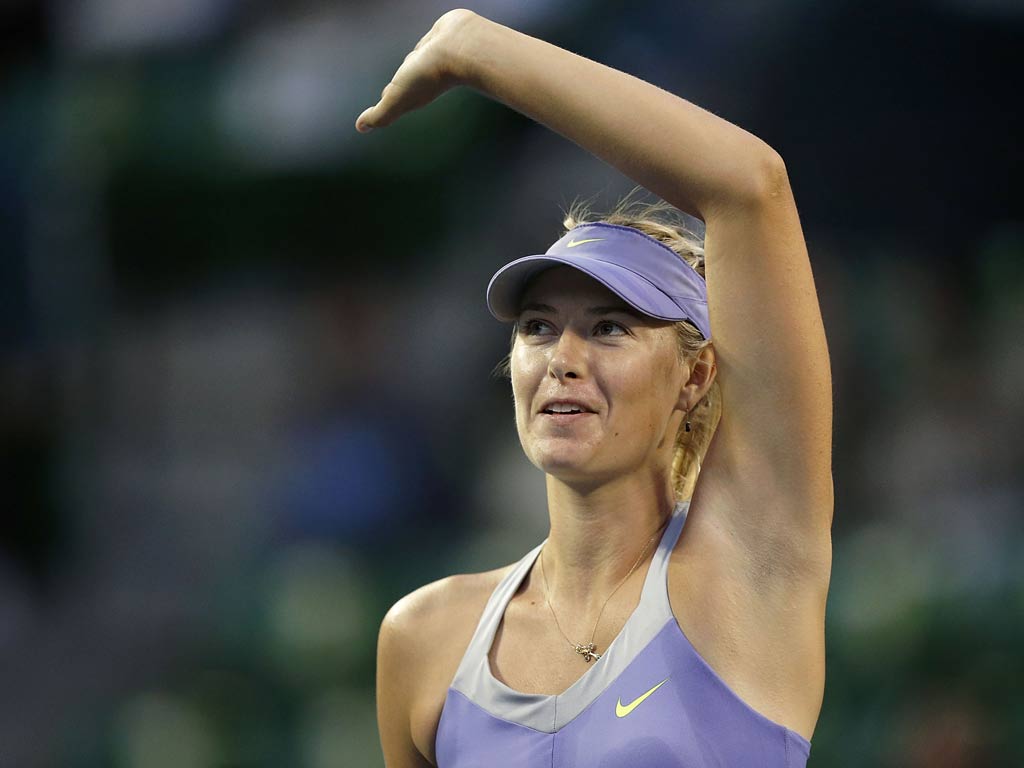Maria Sharapova emerges as surprise supporter of moves to silence tennis grunters

Your support helps us to tell the story
From reproductive rights to climate change to Big Tech, The Independent is on the ground when the story is developing. Whether it's investigating the financials of Elon Musk's pro-Trump PAC or producing our latest documentary, 'The A Word', which shines a light on the American women fighting for reproductive rights, we know how important it is to parse out the facts from the messaging.
At such a critical moment in US history, we need reporters on the ground. Your donation allows us to keep sending journalists to speak to both sides of the story.
The Independent is trusted by Americans across the entire political spectrum. And unlike many other quality news outlets, we choose not to lock Americans out of our reporting and analysis with paywalls. We believe quality journalism should be available to everyone, paid for by those who can afford it.
Your support makes all the difference.Plans to muzzle the ear-bashing grunters of women's tennis have found an unlikely ally in Maria Sharapova.
One of the worst offenders, Sharapova's screams have been measured at more than 101 decibels - comparable to a chain saw, a pneumatic drill or a speeding train.
The sport's governing body is to educate players to turn down the volume after pressure from fans, TV broadcasters and a handful of competitors fed up with the constant shrieking on court - and Sharapova thinks it is the right answer.
The WTA plans to muzzle the next generation with the aid of umpires armed with hand-held devices to measure noise levels on court. Education at major tennis academies and with juniors and players at lower-tier tournaments has already begun.
"Bottom line is the right answer has been taken by the tour," Sharapova told Reuters, safe in the knowledge she will not be told to shush.
"I started grunting since whenever I can remember," she added at the Pan Pacific Open in Tokyo. "I see videos of myself and I've grunted for that long. Nobody told me to do it in Russia or in Florida. It's just a natural habit."
Grunting made headlines again this year after Belarusian Victoria Azarenka and Sharapova screeched their way to the first two grand slam titles of 2012.
"The information going towards coaches and academies that are developing talent from a young age is teaching them a certain breathing technique," said Sharapova.
"Because when you start something from a young age and continue it, it's a habit - whether you do grunt or don't grunt.
"The WTA created a plan. That's the smart way to go about it, rather than like taking someone's forehand and grip in the middle of their career and telling them to change it."
However, nine-times Wimbledon singles champion Martina Navratilova calls grunting "cheating, pure and simple" and wants rule changes sooner rather than later.
Tennis coach Nick Bollettieri, who has trained many of the game's super-grunters, including Sharapova, has been accused of teaching it as a ploy to distract opponents.
Monica Seles, Larcher de Brito, the Williams sisters and Andre Agassi have all passed through Bollettieri's academy in Florida.
Bollettieri denies the accusation but Caroline Wozniacki's complaints about grunting last year prompted the WTA to approach his academy to discuss ways of preventing the next generation from developing the habit.
Fans in Tokyo last week were divided on the subject of grunting, made famous by Monica Seles in the 1990s.
"I like it when Sharapova screams," said 27-year-old dental assistant Saeko Hasebe. "It's part of the fun. They shouldn't ban it."
Businessman Makoto Taniguchi disagreed.
"It's too noisy," the 38-year-old said after an Azarenka ear-bashing. "I've only been here for two hours and I've got a splitting headache."
Pan Pacific Open winner Nadia Petrova rejected claims grunting was a deliberate tactic and predicted it would take a long time for the WTA to change the rules.
"It can be enforced, but it's something very difficult to do," said the Russian. "The players have been doing it since they were little and (had) been taught to do this.
"It's difficult to change after so many years. There are a few players obviously who are a little bit overboard with their grunting.
"I think the main reason is some coaches say the larger you grunt the more air you let out of your lungs to actually execute the stroke harder so you can hit harder.
"I guess that's why. That's the only explanation I have. I don't think they even realise how loud they get."
Studies back up Petrova's theory that the squealers are not faking, claiming that yelling can give people an energy boost or increase adrenalin.
This year's London Olympics were a festival of grunting, with fencers screaming, stomping and whipping off their masks to prance and preen after a successful point.
Yet controversy rages over women's tennis.
"Maybe (the WTA need to) work out why it's happening," former U.S. Open champion Samantha Stosur said. "Almost everyone grunts. Is it exertion or is it something else?"
Critics are accused of sexism, given grunting is hardly restricted to the women.
Eight-times grand slam winner Jimmy Connors grunted furiously in the 1970s and 80s, while Ivan Lendl once complained that Agassi's grunting put him off.
"Maybe it's just not as high-pitched so you kind of don't worry about it," said Stosur.
British number two Heather Watson claimed not to have noticed Sharapova's cacophony during a three-hour marathon with the Russian last week.
"I think I'm just too used to it," said Watson, who also trains at the Bollettieri academy and works with Sharapova's former coach Mauricio Hadad.
"I know some players don't like it. But most girls grunt so I really don't take much notice."
Reuters
Join our commenting forum
Join thought-provoking conversations, follow other Independent readers and see their replies
Comments